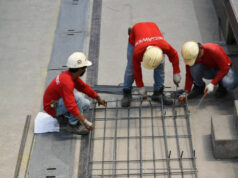
THE latest earnings results of Bank of the Philippine Islands (BPI) and news on putting Metro Manila at the strictest form of lockdown led to increased trading activity in the bank stock last week.
The Ayala-led lender was the tenth most actively traded stock last week with a total of 8.12 million shares worth P675.33 million having exchanged hands on the trading floor from July 26-30, data from the Philippine Stock Exchange showed.
BPI shares closed at P80.50 apiece on Friday, down 6.9% from its July 23 closing price of P84.50 apiece. Year to date, its price has gone down by 2.3%.
“There were a lot of factors that affected BPI stock price movement [last] week. But the most significant one for the overall market sentiment… was the last-minute announcement of ECQ (enhanced community quarantine) for NCR (National Capital Region) starting Aug. 6 to 20 because of the threat of the new Delta variant,” said I.B. Gimenez Securities, Inc. Research Head Joylin F. Telagen in an e-mail, referring to the more infectious variant of the coronavirus disease 2019 (COVID-19).
In a Viber message, Mercantile Securities Corp. Analyst Jeff Radley C. See attributed the stock movements to BPI’s second-quarter earnings report released on July 22 and the updates surrounding its merger with thrift bank subsidiary BPI Family Savings Bank (BFSB).
The government approved last Friday the imposition of ECQ in Metro Manila to curb the spread of COVID-19’s Delta variant. The ECQ, which is the country’s strictest form of lockdown, will span from Aug. 6 to 20.
The announcement came just after Malacañang said on Wednesday that Metro Manila and nearby provinces of Bulacan, Cavite, Laguna, and Rizal, or the NCR Plus bubble, will remain under the lighter general community quarantine (GCQ) until mid-August.
Prior to the ECQ, Metro Manila was placed under GCQ “subject to heightened and additional restrictions” from July 31 until Aug. 5. Under the added restrictions, indoor and al fresco dining will be prohibited, and only authorized persons will be allowed to travel to and from the NCR Plus bubble.
Meanwhile, BPI in earlier July obtained the approval of the Philippine Deposit Insurance Corp. to pursue its planned merger with BFSB. A few days later, the Philippine Competition Commission said the merger can be exempted from its review as it qualifies as an internal restructuring.
BPI will still need to secure approval from other regulators, including the Bangko Sentral ng Pilipinas and the Securities and Exchange Commission (SEC), to push through with the merger.
To recall, BPI announced its plan to absorb BFSB in January with the former as the surviving entity. The plan was approved by a quorum or at least two-thirds of BPI’s stockholders in April.
BPI’s net income stood at P6.8 billion in the second quarter, 28.8% higher than the P5.4 billion posted in the same period last year, it said in a disclosure to the stock exchange on July 22.
This brought its profit for the first half to P11.8 billion, up by 1.2% from the P11.756 billion seen a year ago.
“On conservative note, I’m looking at P23.50 billion for the year,” I.B. Gimenez Securities’ Ms. Telagen said when asked on her outlook on the bank’s financial performance this year.
For Mercantile Securities’ Mr. See: “[BPI’s] earnings would be consistent going forward. Not much news so far for the company as the Delta virus is still the number one concern of investors.”
“The stock is nearing support level of P80, which may go below due to bearish market sentiment, while resistance is at P84 pesos,” he said.
For Ms. Telagen: “BPI is fundamentally good, but technically, BPI is consolidating at P79-P90 within the long-term uptrend channel,” she said.
“Breakdown within the P79-support might revisit P65 per share. Breakout to P90, [the stock] will retest P100 to the [all-time high] P129,” she added. — Abigail Marie P. Yraola



